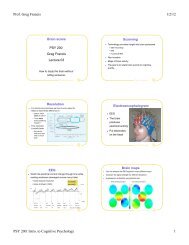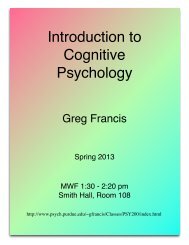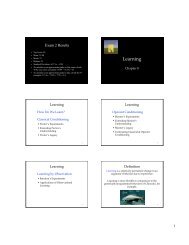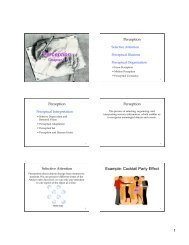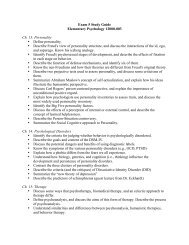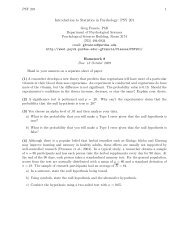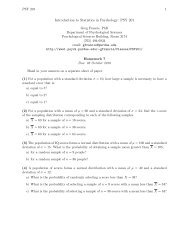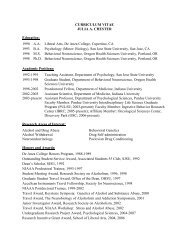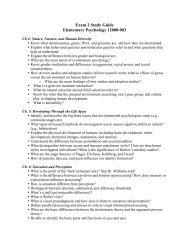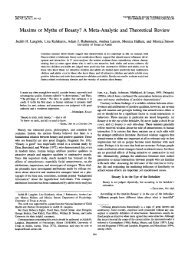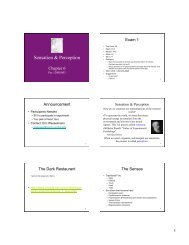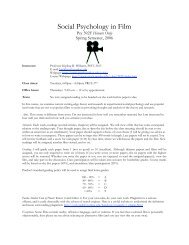Exam 4 Study Guide[1]
Exam 4 Study Guide[1]
Exam 4 Study Guide[1]
- No tags were found...
Create successful ePaper yourself
Turn your PDF publications into a flip-book with our unique Google optimized e-Paper software.
<strong>Exam</strong> 4 <strong>Study</strong> <strong>Guide</strong>Elementary Psychology 12000-003Ch. 10: Intelligence• Arguments for and against considering intelligence as one general mental ability.• Gardner's and Sternberg's theories of intelligence.• Define intelligence test and discuss the history of intelligence testing.• Distinguish between aptitude and achievement tests, and describe modern tests of mentalabilities, such as the WAIS.• Discuss the stability of intelligence scores over the life span.• Discuss the two extremes of the normal distribution of intelligence.• Discuss the evidence for environmental and genetic influences on individual intelligence.• Discuss whether intelligence tests are biased, and describe the stereotype threatphenomenon.• What are reliability and validity? Why are they important for measurement?Ch. 11: Motivation and Work• Define motivation as psychologists use the term today.• Name four perspectives used to study the motivation for a behavior. Know similaritiesand differences between the perspectives.• Understand why laboratory rats might prefer “earning” food to getting it for free (i.e.,having it provided to them).• Describe Maslow's hierarchy of needs.• Explain how the eating disorders anorexia nervosa and bulimia nervosa demonstrate theinfluence of psychological forces on physiologically motivated behaviors.• Summarize current views on the number of people whose sexual orientation ishomosexual, and discuss the research on environmental and biological influences onsexual orientation.• Describe the adaptive value of social attachments, and identify both healthy andunhealthy consequences of our need to belong.• Understand the differences between intrinsic motivation and extrinsic motivation andexamples of each.• Describe the concept of self-efficacy and its relevance to motivational theory.• What is achievement motivation? What kinds of attributions are people with highachievement motivation versus a fear of failure likely to make?• What is job satisfaction? How does job satisfaction relate to organizationally relevantoutcomes?• What are the goals of industrial and organizational psychologists?• What are some of the issues associated with using interviews? What does research tell usabout the efficacy of structured versus unstructured interviews?• What is leadership? What is the difference between leading and managing?Ch. 12: Emotions, Stress, and Health• Identify the three components of emotions, and contrast the James-Lange, Cannon-Bard,and two-factor theories of emotion.• Describe the role of the autonomic nervous system during emotional arousal.
• Discuss the relationship between arousal and performance.• Explain how the spillover effect influences our experience of emotions.• Describe some of the factors that affect our ability to decipher nonverbal cues. How doesgender affect our ability to decipher nonverbal cues.• Discuss the culture-specific and culturally universal aspects of emotional expression, andexplain how emotional expressions could enhance survival.• Name several basic emotions, and describe two dimensions psychologists use todifferentiate emotions.• State two ways we learn our fears.• Identify some common triggers and consequences of anger, and assess the catharsishypothesis.• Summarize the findings on the relationship between affluence and happiness.• Summarize the ways that we can influence our own levels of happiness.


![Exam 4 Study Guide[1]](https://img.yumpu.com/45196739/1/500x640/exam-4-study-guide1.jpg)
